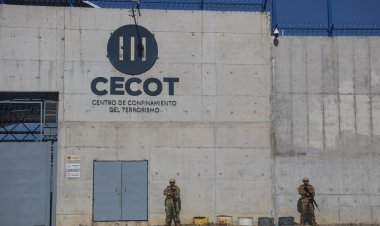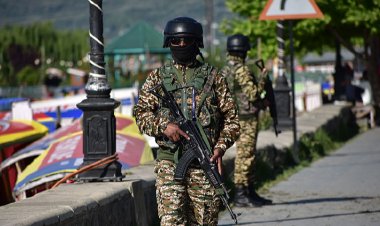Military contractors propose a novel incarceration strategy for detained immigrants
Erik Prince is seeking an arrangement to bypass immigration regulations and facilitate the transportation of detainees from the United States to El Salvador.

The proposal, obtained exclusively by PMG, aims to target “criminal illegal aliens” while attempting to navigate U.S. immigration laws by classifying part of the prison—criticized by human rights organizations for its violence and overcrowding—as American territory.
It remains uncertain how seriously the White House is considering Prince's plan, particularly given the scrutiny he has faced over his firm’s involvement in a deadly incident in Iraq two decades ago. However, it presents an unprecedented opportunity for Prince's group to engage in a highly lucrative aspect of transnational operations that has already sparked controversy, particularly due to the inclusion of immigrants with no criminal records in the U.S.
Discussions with administration officials have taken place, and the proposal is expected to be a key topic in bilateral meetings with El Salvador at the White House next week, as per sources familiar with the proposal and an administration official who requested anonymity to discuss previously undisclosed information.
Administration officials have already considered the possibility of the U.S. acquiring part of the prison complex, with one official noting that the White House is exploring various options in line with the objective of distancing “dangerous people as far away from the continental U.S. as possible.”
There are expectations that the proposal will also be addressed during El Salvador President Nayib Bukele’s visit to the White House on Monday, where he is set to meet with President Donald Trump to discuss immigration issues.
Ultimately, the proposal would place Prince at the helm of a significant privatization initiative, with his company managing logistics for transporting tens of thousands of detainees from U.S. holding cells to the El Salvadoran prison.
An LLC named 2USV was registered in Wyoming on Wednesday, signaling Prince’s team is preparing to advance their pitch to the White House.
This marks Prince's latest attempt to secure government contracts amidst the Trump administration's ongoing challenges in rapidly deporting undocumented immigrants. It follows a previous proposal he submitted, aiming to support the president’s mass deportation efforts—details of which were first reported by PMG. Now, Prince has narrowed his focus, illustrating how the administration's push to fulfill the president's major campaign promise has opened doors for private contractors seeking profit in mass deportations.
The proposal outlines a partnership between Prince’s group and El Salvador to manage logistics for gathering “100,000 of the worst criminal offenders” from U.S. prisons, detaining them at a 10,000-person camp, and transporting them to El Salvador. To assess immigration status, the group claims it will require access to governmental immigration files, further intertwining private operations with public responsibilities.
Moreover, Prince’s group seeks involvement in immigration courts, a move that could draw significant legal challenges. If an immigrant lacks a deportation order, 2USV would “facilitate a hearing before an immigration judge to adjudicate any pending asylum claim.” The group also intends to collaborate with prosecutors to “make deals with incarcerated individuals whereby some of their prison sentence will be waived in exchange for the granting of a deportation order.”
Included in the proposal is sample language for a “Treaty of Cession,” which aims to designate part of the prison complex as U.S. territory. The document argues that “transferring a prisoner to such a facility would not be an Extradition nor a Deportation.” Once the land is designated as U.S. property, the proposal states that it would be leased back to El Salvador for prison management, requesting the Homeland Security secretary to “suspend the ICE detention standards” to circumvent questions regarding established detention standards.
Also attached to the proposal is a letter from El Salvador’s Minister of Justice and Public Security, Hector Gustavo Villatoro, dated March 13. The letter states that through his new entity 2USV, Prince is acting as a “trade agent” for El Salvador to “reach an agreement on the use of El Salvador’s prisons to house foreign criminals.” Requests for comments from Bukele's spokesperson and the embassy about the country’s involvement in the project have gone unanswered.
The letter asserts that the prison complex can accommodate “up to 40,000 criminals immediately,” with potential future capacity for “100,000 criminal aliens.”
Prince initiated discussions with El Salvador before Trump's election and first proposed using their prisons for migrants, as per one of the sources acquainted with the process. These discussions reportedly accelerated post-election, with the letter indicating that Prince proposed his “commercial terms” prior to Secretary of State Marco Rubio’s visit to El Salvador in early February.
During a visit in August, Prince toured the prison complex and met with Bukele to discuss the country’s crime-fighting initiatives. At that time, he also expressed dissatisfaction with the State Department’s travel advisory, which the Trump administration has since improved, enhancing El Salvador’s travel safety designation to the highest level, surpassing several Western European nations.
The proposal suggests the arrangement could help the Trump administration navigate legal constraints associated with the president’s invocation of the Alien Enemies Act, a law granting powers to detain and deport noncitizens during wartime. This could also ease logistical issues tied to using the Naval base in Guantanamo Bay, assisting the administration in deporting individuals who cannot be returned to their home countries.
Nonetheless, the proposed solutions may not fully resolve legal uncertainties surrounding the use of the Alien Enemies Act by Trump, invoked in March to deport hundreds of Venezuelans. The Supreme Court recently lifted a temporary ban on the administration's use of this historical law, but ruled that those identified as “alien enemies” must be given a chance to contest their deportations. This decision has resulted in additional complications for the Trump administration.
Despite the court's ruling being narrow, significant legal questions remain regarding the appropriateness of using a wartime law when the United States is not actively engaged in war.
There are likely to be further legal complications with this proposal, which acknowledges the likelihood that “this effort will be tested judicially by the ACLU or other activist group.”
Even though the proposal targets undocumented immigrants, it raises concerns about potentially paving the way for the deportation of U.S. citizens—an idea Trump has occasionally floated, according to a former Department of Homeland Security official who asked to remain anonymous while discussing the plan.
Trump declared over the weekend that he would “love” to deport citizens to El Salvador, adding: “If they can house these horrible criminals for a lot less money than it costs us, I’m all for it.”
Monday’s meeting coincides with the Trump administration's existing plans to increase the number of immigrants sent to El Salvador. DHS Secretary Kristi Noem mentioned on Wednesday that she had recently met with Bukele, urging him to continue accepting terrorists from the U.S. who “no longer belong here.”
Trump cited the 1798 law in March to send hundreds of Venezuelans to El Salvador, whom the administration alleged were associated with the Tren de Aragua gang—an action that incited prompt legal challenges. Family members and attorneys have argued that certain detainees have no connections to the gang. Recently, the Supreme Court mandated the administration ensure the return of a Maryland man who had been deported to the prison despite being under protective legal status.
Previously, the Trump administration formed a one-year agreement with El Salvador to imprison over 200 alleged gang members there. The specific timing of this agreement’s establishment remains unclear, but its announcement followed Trump’s March 15 deportations. So far, the U.S. has allocated $6 million to El Salvador, although details on how much Prince and Bukele aim to increase the funding remain vague. The draft proposal obtained by PMG did not include a budget outline.
Earlier, Prince's group had proposed a more extensive mass deportation plan that involved an army of private agents capable of arresting and removing 12 million people for a price tag of $25 billion. Although this plan has not been embraced by the White House, it raised several legal concerns that overlap with the current proposal.
The founders of 2USV possess a long history of collaboration with the U.S. government and connections to Trump’s administration. Blackwater, which Prince established in 1996, originally provided training services to law enforcement and military personnel. It gained notoriety for its operations in Iraq and Afghanistan, delivering security services for U.S. officials and military personnel. Critics have condemned Blackwater’s emergence as indicative of the U.S. military’s overreach in the Middle East, raising questions about the oversight and accountability of private contractors.
Camille Lefevre for TROIB News












